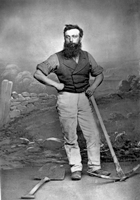The First-Foot Poem by Alexander Anderson
The First-Foot
Bright the firelight touch'd his portrait hanging on our humble wall,
But a sweeter light was in us, with a deeper, purer glow—
He was coming home, our darling—fair and frank, and broad and tall
First-foot on our simple threshold, cover'd with the New Year's snow.
'Twelve o'clock will strike, dear wife, before the train comes in to-night,'
Said my husband at the doorway, he, too, glad at heart and gay;
And he turn'd a step to meet me as I whisper'd, soft and light,
'Let him enter first,' and, smiling at my words, he went away.
Then I turn'd, my own heart bursting at the joy about to come,
Drew the chair a little nearer to the glowing evening fire;
Heard in freaks of my own fancy all the laughter and the hum
Of a well-known voice that whisper'd ever at my least desire.
Fondly to myself I pictured all his much-prized honours won,
Earnest of the future harvests that the years would open up;
Caught a hundred whispers rising with this burden still, 'our son;'
O! a mother's joy has not one drop of gall within the cup.
Then I went, and by the window watch'd with eager gazing eye
All the distant railway lights that slowly came in sight to me;
Question'd to myself, 'Now, which of these far lights is bringing nigh
Our first-foot for the New Year that in one little hour will be?'
But a deep chill, like a viper's touch, crept through me as I stood,
Bringing hand-in-hand a terror, as behind the farthest light
Rose another in the darkness, that like one great splash of blood,
Gleam'd like a murder seen of God within the folds of night.
Rooted to the place I stood, and watch'd its steady, fiery gleam,
All the pulses in my being beating as in act to fail;
And my heart sank down within me, like a stone flung in the stream,
As behind it rose an engine's whistle with a ghostly wail.
For at that drear whistle all the years broke from their rusty bands,
Each one teeming with its fatal slip that happen'd in a breath—
How a traitor wheel, or pointsman's hasty clutch of faithless hands,
Scatter'd broadcast human lives to grace the silent feast of death.
Ah! what battles hope had all that weary hour with countless fears;
What deep, silent prayers rose upward that the lips still fail'd to speak;
What deep pain within the bosom, with its load of unwept tears,
That would not give one kindly drop to soften brow or cheek.
Came the hour at last, and striking, each stroke sounded like a knell,
Bodeful of some fate—but, hark! a sound of footsteps at the gate,
And my tears burst from their prison, and rose upward like a well,
At the coming joy about to crown my long and weary wait.
Then I heard the sound of whispers faint, as if in awe suppress'd,
And with all my wild, deep dread within, I open'd up the door—
Saw a burden in strange arms, and in their silence found the rest
O my God! first-foot in heaven! and for days I knew no more.
Slowly dawn'd the truth upon me, as my life came back again—
How a signal, clear a moment to the engine-driver's eye,
Brought him on with ringing rush and crash against and through the train!
And my life's one hope lay mangled in that sudden shock and cry!
Years have pass'd, but still that time brings round the great red light to me;
With it come the solemn footsteps, and the whispers hush'd and low;
And again the door is open'd, while like one struck dumb I My darling's blood with that round light upon the ghastly snow.
This poem has not been translated into any other language yet.
I would like to translate this poem